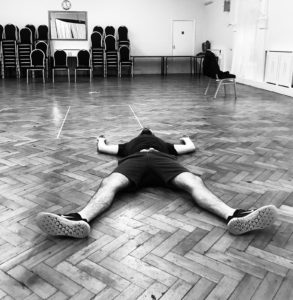Week One: 29th of July to 3rd August
By Kaffe Keating
“I will not give my part in this sport for a pension of thousands to be paid from the Sophy.”
Fabian, Act 2 Scene 5.
One of the best lessons I’ve learnt about acting, especially in theatre, is to approach it like it’s a game. Maybe even a sport, depending on the show.
Games have rules, and some have more than others. Football (or maybe soccer depending on where you’re from) is a sport with relatively few rules, at least compared to rugby; which if you don’t know has bloody loads. Both are great fun to watch and to play and the joy comes from the fact that the players are forced create things within the boundaries of the rules of the game they’re playing. It’s not much fun to watch people playing a game where you don’t know the rules – I’m looking at you, cricket – and equally a game without rules at all, without form, is no fun for anyone. That’s just some people standing around in a field.
Not unlike the feeling on the first day of rehearsals when your task is to create a performance of Twelfth Night without a director…
Luckily, we’ve been provided with a few rules to get us going.
First things first, there are only five of us. The dramatis personae (or ‘cast list’ if you’re not as fancy as me) for Twelfth Night features at least eighteen speaking parts. Thankfully the roles we’ll be playing have been decided already, sparing us from having to fight to the death over who gets to say all the famous bits. Inevitably, there are points where two or even three of one actor’s characters are on stage at the same time, having a full-blown conversation with each other. So there’s that.
We are also required to mark out our playing space, our pitch or court, where we’ll tell the story. The auditoria we’ll be playing once we arrive in the States will vary in size and shape and so we need to maintain a level of consistency. Pitch sizes need to be standardised, after all. When an actor is not in the scene, they’re sat on a chair outside of this space, but still in full view of the audience. So no retreating to the dressing room for a cup of tea and the crossword between soliloquies…
Our props and our costume must all fit into a suitcase. Which will have a weight allowance. That means simplicity and clarity is the name of the game and the doublets, hoes and ruffs will need to be left at home where they belong.
Finally, and most importantly, we’ve got the words of the play. This is what we’re here to serve. Our job is to dig down into what’s written here and bring up what we’ve found to show an audience.
So that’s the beginning of a game then. That’s something to start with.
Unfortunately, the week began with some sad news. Anna Wright, who was set to play our Olivia and Maria, and who had lent those characters such energy and gusto in the read-through back in June, has had to pull out of the show due to health reasons. She’ll be sadly missed but her heroic replacement, seasoned AFTLS veteran Claire Redcliffe, has joined our team as a super sub.
This first week has been all about testing out rules for the game we’re all going to play together. Are they fun? Are they clear? Will an audience be able to learn them quickly enough?
After some slight tentativeness (it’s hard when you’re used to having a director set the tone and tell you what to do), we crack on with the first scene.
Just to see what happens. You know, no pressure. Just try something. ‘Fail better’ and all that.
If you don’t know, Twelfth Night begins with one of those lines that would make it onto a Shakespeare’s Greatest Hits album, no question: ‘If music be the food of love, play on’. Maybe in a slight panic, I offer the possibility that Orsino himself is the one playing the music and grab a guitar to hide behind. I mean, he’s talking about music, right? This yields a suggestion that maybe Orsino fancies himself as a bit of a songwriter himself and that the men of his court, Curio and Valentine, have been corralled into his band. It’s a mad choice, and one that may not survive, but it led to more ideas later on – which is what rehearsal is all about.
We carry on in this fashion, working our way scene by scene through the play, eventually falling into a rhythm with each other.
First, we’d just have a crack at the scene on its feet, with no real idea of performance or worrying too much about an audience. Just hearing it. Seeing what it does. Checking what bit of you it tickles. If you’re in the scene, you’re an actor; if you’re not, you’re a director. The directors would give the actors notes and then we’d try the scene again.
It was like starting with a lump of clay and moulding it a little each time to see what kind of pot it might end up looking like. There’s every chance that you’ll get so far with one design and then chuck it out before it even makes it to the kiln, but the time invested in becoming a better potter is valuable nonetheless.

It’s full on, jumping between roles like this: being an actor one minute, a director the next, then switching to view things as a designer, then as a stage manager and in my case, as the person who made a big statement on the first day by showing up with a guitar under his arm, a composer. ‘Composer’. Honestly. Katherine Newman, our Viola and Sebastian, managed to capture a candid moment where I was ‘recovering my energy,’ shall we say.
But then went on to prove herself that a bit of a lull can happen to the best of us…
We crack on on Monday, figuring out the rules to our game – testing them, improving them, and making sure they’re actually fun.
Can’t wait.
